3. We made progress in our oversight work with the focus on making our oversight more effective.
The Standing Committee conscientiously performed its oversight functions and powers, focusing on serving the overall interests of the country and emphasizing priorities; and improved oversight methods and strengthened its oversight of the State Council, the Supreme People's Court, and the Supreme People's Procuratorate with the focus on making oversight more effective. Over the past year, we listened to and deliberated 15 work reports of the State Council, the Supreme People's Court, and the Supreme People's Procuratorate; inspected compliance with four laws; conducted three special inquiries; and carried out five special investigations and studies.
First, we strengthened oversight of economic work. The Standing Committee listened to and deliberated the State Council's work reports on the interim assessment of the implementation of the Twelfth Five-Year Plan, and on implementing China's 2013 plan for national economic and social development, fully implementing the strategy for large-scale development of the western region, advancing urbanization, and promoting financial reform and development in rural areas. It also carried out investigations and studies on compliance with the Law on Regional Ethnic Autonomy. Members of the Standing Committee noted that under the leadership of the Party Central Committee, the whole nation worked hard as one and economic and social development progressed steadily and improved, getting the Twelfth Five-Year Plan period off to a good start. The Standing Committee stressed the following four points:
1) It is necessary to conscientiously implement the Party Central Committee's policy and arrangements for comprehensively deepening reform; steadfastly seek progress while maintaining stability, and carry out reform and make innovations; attach great importance to serious economic problems; accelerate transformation of the growth model; effectively improve the quality and returns of economic growth; and ensure that the objectives and tasks set forth in the Twelfth Five-Year Plan are accomplished on schedule.
2) In implementing the strategy for regional development, we should continue to give high priority to the strategy of large-scale development of the western region. It is necessary to accelerate economic growth, improvement in people's wellbeing, and environmental protection efforts in the western region; and explore for, divert and conserve water to alleviate the shortage of water resources in the region, and work harder to build highways, railways, rural roads and other infrastructure in order to constantly improve our capabilities to ensure economic and social development in the western region.
3) It is necessary to strive for a new type of urbanization with Chinese characteristics; and provide equal access to basic public services more quickly, improve the quality of the environment in cities, and refine systems and mechanisms for integrating urban and rural development, with the focus on granting urban residency to those who have left agricultural work.
4) It is necessary to deepen rural financial reform, increase financial support for agriculture, and offer more policy support to rural finance in order to make positive contributions to rural development, rural income growth and agricultural modernization.
Second, we strengthened budget and final account review and oversight.
1) At its June meeting, the Standing Committee listened to and deliberated the reports on the central government's final accounts and auditing work in 2012, and reviewed and approved the former. At its August meeting, the Standing Committee listened to and deliberated a report on the implementation of the budget for the first seven months of fiscal year 2013. We urged the State Council and its departments to be more frugal, increase revenue and reduce expenditures, work hard and be economical, do more to reduce expenditures, limit spending to what is affordable, tighten fiscal management, and use government funds more efficiently.
2) At its October meeting, the Standing Committee listened to and deliberated a report on the allocation and use of government funds for science and technology. This was the first time the Standing Committee oversaw the use of government funds for a specific purpose, and it was a useful attempt to intensify its budget oversight.
3) We organized investigations and studies on the examination and oversight of all government budgets and final accounts and set forth the thinking and measures for strengthening this work, and urged relevant government departments to improve budgeting systems for public finances, government-managed funds, state capital operations, and social security.
Third, we improved oversight of the work relating to people's wellbeing. The Standing Committee listened to and deliberated a report on poverty relief and development work in rural areas and fully affirmed the enormous achievements that were made. We emphasized the need to unwaveringly implement the CPC Central Committee's policies and arrangements on poverty reduction and development work, adapt measures to local conditions and give guidance tailored to the situation, focus on key areas and seek substantive results, and alleviate poverty in poor contiguous areas more quickly. We also stressed the need to focus on providing education in poor areas as an important way to prevent poverty from being passed to future generations, effectively ensure that children of the poor receive compulsory education, and enable more children in poor areas to receive vocational or higher education. The Standing Committee inspected compliance with the Law on Compulsory Education, and called on governments at all levels to live up to the people's expectations, fully implement the Party's education policy, promote equality in education, appropriately allocate education resources, lighten the study load of primary and secondary school students, and improve the ranks of rural teachers, so that children can attend school and do well in their studies. When listening to and deliberating a report on the prevention and treatment of infectious diseases, the Standing Committee stressed the need to improve the work mechanism for different government departments working together to prevent and control infectious diseases, support the development of a prevention and control system in the western region and rural areas, intensify publicity of laws and regulations on infectious disease prevention and treatment, and comprehensively improve work in this area.
Fourth, we strengthened oversight of environmental protection. The Standing Committee listened to and deliberated a report on developing a mechanism for compensating for ecological damage and carried out inspections of compliance with the Law on Renewal Energy and the Meteorology Law. Members of the Standing Committee noted that protecting the environment and building a beautiful China require the participation of the whole society and that it is necessary to implement the policy of compensation for ecological damage and accelerate development of a mechanism for compensating for ecological damage based on the principle that developers are responsible for protecting the environment and those who damage it must provide compensation. Members of the Standing Committee specified that it is necessary to strengthen the revision and management of the renewable energy development plan in accordance with the law, further increase government subsidies and tax breaks, and strengthen R&D and application of key technologies in order to provide strong support for the development of renewable energy. The members also specified that it is necessary to step up efforts in meteorology modernization, become better able to use meteorology to prevent and mitigate natural disasters, make weather forecasts and warnings of disastrous weather more accurate, utilize climatic resources in a more scientific way and protect them more effectively.
Fifth, we strengthened limits on and oversight of the exercise of state power. The Standing Committee listened to and deliberated the State Council's report on standardizing law enforcement by public security agencies, the Supreme People's Court's report on the work of jurors, and the Supreme People's Procuratorate's report on procuratorial organs' fight against graft and corruption. The Standing Committee also inspected compliance with the Law on Administrative Review. Its members stated that the key to improving the system that limits and oversees state power is to grant oversight power to the people, exercise power openly, and institutionalize the exercise of state power. Law enforcement and judicial bodies at all levels must use institutional means to oversee the exercise of state power, the handling of state affairs and the conduct of personnel, redouble their efforts in the fight against corruption and the punishment of corrupt people in accordance with the law, make their law enforcement and judicial work more institutionalized and standardized, and strive to ensure that the people feel that every case is handled fairly and justly.
Sixth, we improved the quality and effects of special inquiries. Special inquiries are an important way the NPC oversees the work of the State Council, the Supreme People's Court, and the Supreme People's Procuratorate. The Standing Committee conducted inquiries on prevention and treatment of infectious diseases, allocation and use of government funds for science and technology, and poverty relief and development work in rural areas. Having reviewed past experience, we improved organization of all aspects of special inquiries to make such inquiries more constructive and helpful.
1) We carried out in-depth investigations and studies to improve the quality of inquiries. Members of the Standing Committee shared the concerns of the people, focused their inquiries on key areas and identified pressing problems of public concern.
2) Members of the Standing Committee exchanged more ideas and deepened discussions with government departments. The members could either register beforehand to participate in inquiries or simply ask questions on the spot, and they could ask follow-up questions addressed to the answers given by government departments. Leaders of the relevant State Council departments answered inquiries informatively and frankly, did not evade questions or shift responsibility onto others, and responded to the people's voice with concrete improvements in their work.
3) We made inquiries more transparent to ensure problems identified are rectified. The Standing Committee used a variety of ways to report its inquiries and explored the idea of live broadcasts. It also assigned special committees to strengthen follow-up oversight of serious problems, and urged relevant State Council departments to turn the results of inquiries into improvements in work.
The Standing Committee paid great attention to the records review of normative documents and took the initiative to strengthen the review of them. We reviewed 19 new administrative regulations of the State Council and 32 legal interpretations of the Supreme People's Court and the Supreme People's Procuratorate one by one for the past year, and we urged them to promptly revise or rescind those that conflict with the Constitution and laws.
The Standing Committee of the last NPC arranged the work of reviewing all of China's judicial interpretations and documents with the force of judicial interpretations currently in effect. This is the first comprehensive, concentrated review of its kind since the founding of New China. The Standing Committee of the current NPC listened to and deliberated the report on this work, set forth the requirement to improve the mechanism to make this work a regular practice, and emphasized that such interpretations should be in accord with the intentions of the laws they interpret and established legal principles, help with the practical application of those laws within the laws' scope, safeguard the unity of the country's legal system, and ensure the correct implementation of the laws.
 |  |

 Top 10 safest airlines in the world
Top 10 safest airlines in the world Bridge Worship Festival in Taijiang, SW China
Bridge Worship Festival in Taijiang, SW China 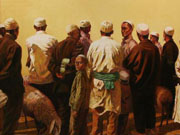 Chinese artists from Flight MH370 and their art
Chinese artists from Flight MH370 and their art Selected photos of 'two sessions'
Selected photos of 'two sessions' Most unusual taxis around the world
Most unusual taxis around the world Sweet photos of mom striking Yoga poses with daughter
Sweet photos of mom striking Yoga poses with daughter Top 10 pure beauties in showbiz
Top 10 pure beauties in showbiz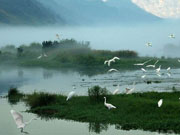 Top 20 happiest cities in China
Top 20 happiest cities in China Beautiful fisherwomen in SE China
Beautiful fisherwomen in SE China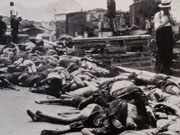 History in photos: Anti-Japanese War (1937-1945)
History in photos: Anti-Japanese War (1937-1945)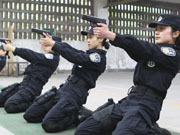 Female SWAT team in Chongqing
Female SWAT team in Chongqing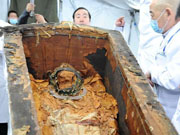 1,500-year-old coffin excavated from grassland in N China
1,500-year-old coffin excavated from grassland in N China Ballerinas anywhere but onstage
Ballerinas anywhere but onstage
Day|Week|Month